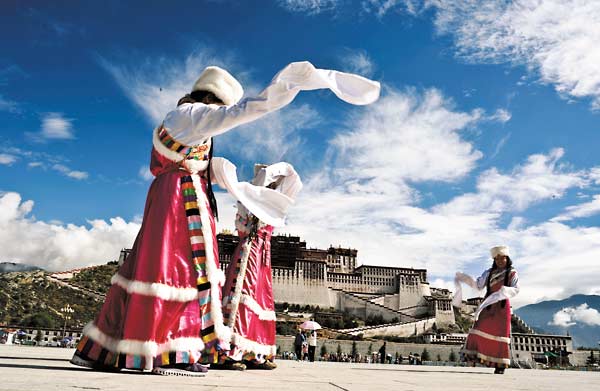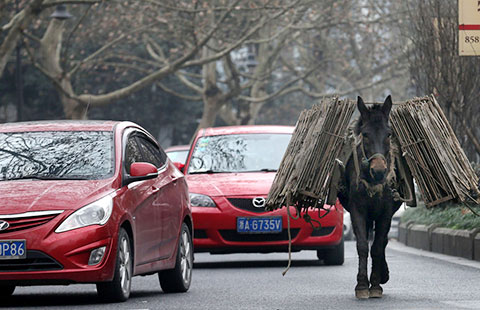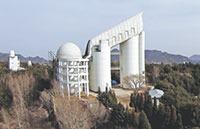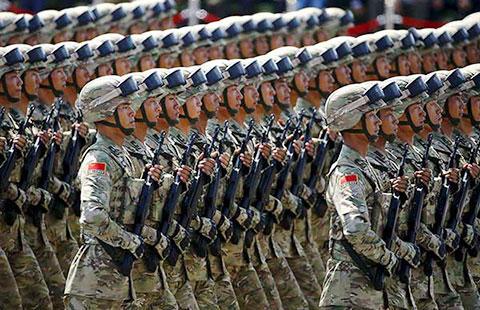Lhasa ranks at top of residents' happiness list
By Li Yao in Beijing and Da Qiong in Lhasa (China Daily) Updated: 2012-08-21 01:35Lhasa, the city of sunlight, topped an annual survey of residents' sense of happiness in Chinese cities.
The capital of the Tibet autonomous region has ranked at the top of the survey conducted by China Central Television for five consecutive years.
|
 People in colorful Tibetan costumes pictured in front of the Potala Palace in Lhasa, capital of the Tibet autonomous region, in July. [PHURBU TASHI / XINHUA] |
In this year’s list, Lhasa was followed by Taiyuan, capital of Shanxi province, Hefei, capital of Anhui province, Tianjin municipality, Changsha, capital of Hunan province, and Hohhot, capital of the Inner Mongolia autonomous region.
The capital cities where residents have the most leisure time include Guiyang, Haikou, Guangzhou, Hangzhou, Lhasa, Chengdu and Chongqing.
Around 100,000 households from 104 cities were polled for the survey.
The results showed income level most affected people's sense of well-being (55.5 percent), followed by health (48.9 percent) and quality of marriage or love life (32 percent).
Among people with an annual income of 100,000 yuan ($15,700) or more, 6 percent of respondents said they did not have enough free time, compared with 12 percent for those earning 20,000 yuan or less a year.
People’s favorite leisure time activities are surfing the Web and watching TV. Only a small percentage of respondents said they used free time for education, training, going to the gym or social life, according to the results.
Zou Jun, director of the Jiangsu Institute of Urban Planning and Design in Nanjing, said although similar rankings have been conducted by different organizations, the effort is worthwhile because it helps city administrators create new development paths that give greater consideration to residents’ welfare.
The rankings are a reminder to city planners that they should not only address short-term problems such as creating new jobs, but also long-term ones such as providing a decent standard of living and public services for low-income and migrant households, he said.
Zou said officials like to construct landmark buildings or entertainment facilities in city centers as main attractions, but "a city exists not just for tourists. It exists, more importantly, for those who actually live there".
No cities from the Yangtze River Delta or Pearl River Delta regions appeared in the new rankings. Zou said people in these regions may have higher incomes but less leisure time for cultural and spiritual interests.
Wang Wenjie, 27, has worked as a human resources specialist at a pharmaceutical company in Shanghai for two years. She has adopted a positive mindset to deal with daily pressures.
"I have a circle of close friends. And I am surrounded by intelligent people with similar interests. Such an environment inspires me to grow and learn," Wang said.
Wang’s parents in Fuzhou, Fujian province, used to worry about her, but after visiting Shanghai they became convinced that she enjoys living there.
Wang said she enjoys helping people learn new skills and seeing a sparkle in their eyes.
"I think of five things that I am grateful for when I go to bed every night," she said, "For me, keeping a positive mindset is the key to finding happiness in life."
Wang finishes work at 5 pm and has plenty of time to do activities she enjoys, such as swimming, hanging out with friends, going to a reading group and watching theater performances.
"Living in big cities may involve pressure due to higher expenses. But they can offer a rich cultural life for people to feel more fulfilled," she said.
Contact the writers at
liyao@chinadaily.com.cn and daqiong@chinadaily.com.cn
- Efforts to be stepped up to reduce overcapacity
- Senior Chinese leader urges continued anti-graft efforts
- Xi stresses 'green development' along Yangtze River
- Court museum open free to public
- From pension to GDP: the Government's New Year Resolutions
- Inspection team shifts to high gear, grills Hebei's top leaders
- Public-interest lawsuit plan tested
- Leaders point the way for social change
- Li Keqiang meets British foreign secretary
- Second test flights performed at Nansha Islands







